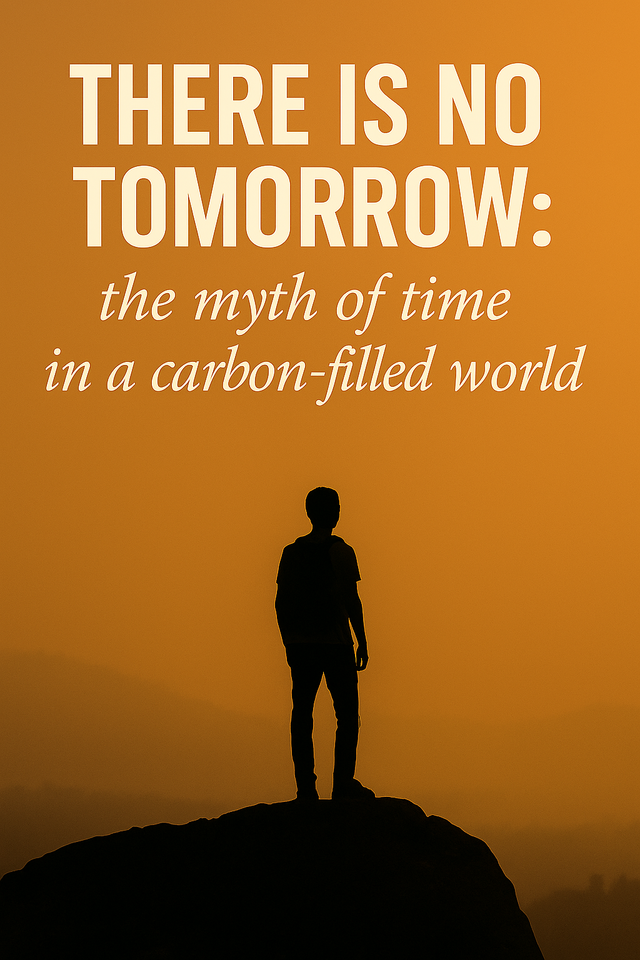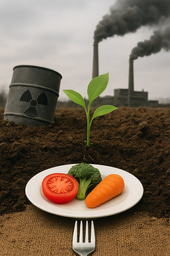THERE IS NO TOMORROW: The myth of time in a carbon-filled world

In the story of climate change, humanity continues to narrate itself as a spectator observing the planet from a distance, as if the fires, floods, and droughts are separate from us. But this is a dangerous illusion. We act today, yet we imagine that tomorrow is a clean slate. This belief, while comforting, is perhaps the most consequential lie we tell ourselves.
My reflection begins with a poetic conviction: there is no tomorrow. Not in the linear, moral sense. Not in the atmospheric, chemical sense. The climate system does not reset. It does not forget.
The Carbon that Lingers
Every action we take today burning fossil fuels, clearing forests, producing cement releases carbon dioxide and other greenhouse gases into the atmosphere. Unlike water vapor or some short lived pollutants, these gases do not simply vanish. Carbon dioxide, in particular, can remain in the atmosphere for hundreds to thousands of years (Archer & Brovkin, 2008). The emissions of the past century are still shaping our weather, altering our seasons, warming our oceans.
When we drive a diesel truck or light up a coal plant, we emit carbon with the false reassurance that tomorrow will come, fresh and consequence free. But that tomorrow never truly arrives it simply inherits today’s leftovers. We live within a system where time is circular, not linear. Our ancestors’ emissions are not history. They are our inheritance. And our emissions today will be the inheritance of generations unborn.
Time Is a Concept. The Earth Doesn’t Obey It
Humans invented clocks, calendars, deadlines, and school terms to compartmentalize time. But the Earth does not follow this order. It works in cycles, feedback loops, cascades.
The warming we see today is not only the result of this year's emissions, but of the cumulative weight of centuries of industrial and land use decisions. We are entangled in a temporal system where the actions of one era bleed into another. That’s why a forest burned today in Zambia may be tied to emissions from a 1980s factory in Europe or an American freeway in the 1990s.
Yet, culturally, we have been conditioned to believe in redemption by delay. “We’ll fix it tomorrow,” is the lie whispered in policy chambers and boardrooms. Tomorrow is the comfort of the privileged. But from the vantage point of the Earth’s climate system, tomorrow is indistinguishable from today.
There Is No Tomorrow, Only the Echo of Now
In Zambia, rural communities are already grappling with erratic rainfall, prolonged droughts, and shifting planting seasons. These are not projections they are present realities. Climate change is not a future problem. It is an ever present condition. It arrives not with a bang, but with an unraveling.
The emissions we produce today are not isolated. They are entries in a long atmospheric ledger. Carbon dioxide doesn’t disappear after a good night’s sleep. It accumulates, layer upon invisible layer, heating the planet and warping its stability. As long as we think tomorrow offers a clean break from today, we will keep acting as if we’re not already deep into a crisis. This isn’t merely scientific. It is philosophical. It is psychological. And it is deeply moral. There is no tomorrow means that the concept of delay is obsolete. That we must think and act as if we are living one continuous, irreversible day.
Rethinking Our Actions
The Only Moment That Exists Is Now
The climate doesn’t operate on annual reviews or election cycles. It doesn’t care for quarterly profits or calendar years. What it registers is cumulative impact what we release into the air, take from the soil, and erase from ecosystems. That impact compounds. It thickens. And it becomes climate. If we are to survive not just adapt, but thrive we must embrace a new narrative. One that doesn’t delay responsibility to a fictional tomorrow. One that holds us accountable in this moment.
We must plant trees today not for tomorrow, but because the carbon released yesterday demands compensation. We must shift to renewable energy today not just to save money in the future, but to end the ongoing betrayal of the present. We must change what we eat, how we travel, what we produce, and how we consume not because the future demands it, but because today is already full. Climate action must stop being a promise for a better future. It must become a declaration of loyalty to the Earth right now.
In a nutshell, the illusion of tomorrow is killing us. Our timelines have become excuses. Our projections have become hiding places. But the atmosphere is not waiting for us to figure it out. It is already reacting. The feedback loops are already accelerating. We must break the myth of tomorrow. There is only now. The carbon we emit today will remain long after we are gone. The forests we burn will not forget. The air we pollute does not forgive. We live in one long, continuous day and every second counts.
References
Archer, D., & Brovkin, V. (2008). The millennial atmospheric lifetime of anthropogenic CO₂. Climatic Change, 90(3), 283–297. https://doi.org/10.1007/s10584-008-9413-1



Please sign in or register for FREE
If you are a registered user on WildHub, please sign in
🔥 “We live in one long, continuous day, and every second counts.” That line struck me deeply, @Marvelous Chilufya. Your reflection doesn’t just highlight the chemistry of carbon; it challenges the very way we relate to time, responsibility, and interconnectedness.
As someone passionate about amplifying youth and underrepresented voices in conservation, I truly appreciate your poetic courage. The myth of tomorrow has indeed become a refuge of inaction. Your framing, linking the emissions of past generations to the lived realities of rural Zambian communities today, reminds us that climate justice is not just scientific or technical; it's personal and moral.
I wonder how we can help others embrace this mindset in practical ways. What shifts would make climate action feel like loyalty to the present, rather than a promise to the future?
Grateful for your voice and vision. Let's continue to dismantle comfort and plant conviction.
Warm Regards,
Simon.
Thank you for this powerful reflection Marvelous: your words truly resonated. 🌍 I’ve added your post to our Sustainability room so that members who’ve opted in will receive an email notification and your insight reaches more readers. I really appreciate your thoughtful contributions to our community so far, and it’s exciting to read that you’ve applied for our WildHub Catalyst programme; you’d make a fantastic addition to the team!
Tagging in a few members who I believe would appreciate this perspective too: @Ussi Abuu Mnamengi @Renuka Thakore @Jose Esteves —keen to hear your thoughts.
I LOVE reading your posts, always well written and very insightful. Keep them coming! 🙌
I wish the people of Afrikaans many blessings. Science claims that you were the first people. I am Native American and we say that the Afrikaans are "People of the Water". You are Grandmothers and Grandfathers of us all. Thank you for continuing to fight for our "mother earth". I support Africa. I support the Afrikaans.
Many Blessings,
Tyler Pounds